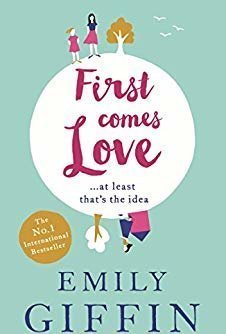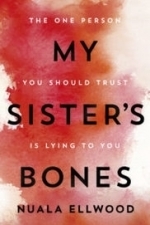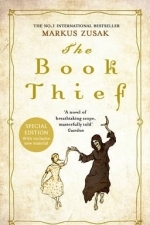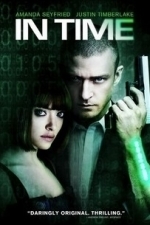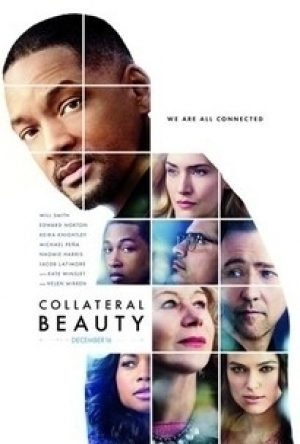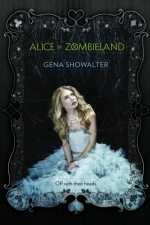Search
Search results
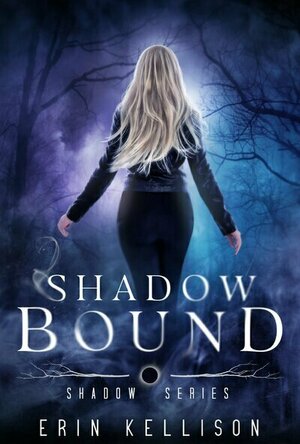
Shadow Bound (Shadow #1)
Book
Enter a world of perilous fae magic in Erin Kellison's captivating Shadow Series... Talia O'Brien...
Urban Fantasy Romance Mystery
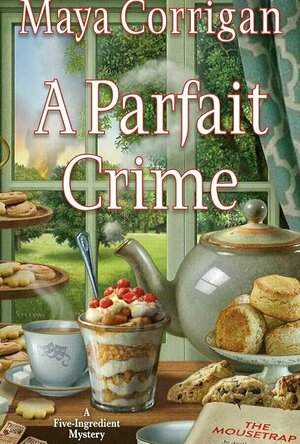
A Parfait Crime
Book
Set in a quaint Chesapeake Bay town, the latest novel in Maya Corrigan’s Five-Ingredient Mysteries...
Whatchareadin (174 KP) rated First Comes Love in Books
Apr 9, 2019
First Comes Love is the story of a family. A family that is devastated by an extremely tragic event, the death of a child and brother. The story takes place 15 years after this event, and is told through the eyes of the two remaining children, Josie and Meredith. Each sister has a different personality and they definitely see the world from opposing perspectives. When secrets that have been plaguing the sisters for so long come to the surface, the only thing that will keep their relationship together is the love that brought them into this world.
I am a big fan of Emily Giffin. Her books always bring out a host of emotions in me. Happiness, sadness, understanding, compassion. And this title did not disappoint. The newest from the author, it covers the relationship between two sisters in the aftermath of their older brother's tragic death fifteen years earlier. Both still haunted by the events of that night and the outcomes that came from it, will they be able to find the love they have for each other to sort out what is going on.
Josie is the oldest of the two and she is single and a first grade teacher. Starting out her new school year,she finds out that her ex-boyfriend's daughter is going to be in her class. This brings back a whole host of memories from when we they were together and the reason they broke up. Determined not to let this get her down, she makes a very important decision that will change her life forever, the only problem, she's not getting the support she wants, especially from her sister Meredith.
Meredith is the youngest child. She is married to Nolan and has a young daughter named Harper. From the outside, Meredith looks as though she has her life together. She is a lawyer and her and Nolan are living in her childhood home that they bought from her parents. But something is clearly missing from Meredith's life, she's just not sure what it is and how to find it. Hating to be overshadowed by Josie's need for things to be all about her, she takes some time for herself to recognize what is going on in her life and what she can do to fix it.
Thank you to NetGalley and the publishers for giving me this advance copy of First Comes Love
I am a big fan of Emily Giffin. Her books always bring out a host of emotions in me. Happiness, sadness, understanding, compassion. And this title did not disappoint. The newest from the author, it covers the relationship between two sisters in the aftermath of their older brother's tragic death fifteen years earlier. Both still haunted by the events of that night and the outcomes that came from it, will they be able to find the love they have for each other to sort out what is going on.
Josie is the oldest of the two and she is single and a first grade teacher. Starting out her new school year,she finds out that her ex-boyfriend's daughter is going to be in her class. This brings back a whole host of memories from when we they were together and the reason they broke up. Determined not to let this get her down, she makes a very important decision that will change her life forever, the only problem, she's not getting the support she wants, especially from her sister Meredith.
Meredith is the youngest child. She is married to Nolan and has a young daughter named Harper. From the outside, Meredith looks as though she has her life together. She is a lawyer and her and Nolan are living in her childhood home that they bought from her parents. But something is clearly missing from Meredith's life, she's just not sure what it is and how to find it. Hating to be overshadowed by Josie's need for things to be all about her, she takes some time for herself to recognize what is going on in her life and what she can do to fix it.
Thank you to NetGalley and the publishers for giving me this advance copy of First Comes Love
BookInspector (124 KP) rated My Sister's Bones in Books
Sep 24, 2020
This novel started creating tension from the first pages, and it kept the intrigue going all the way till the very last page. This book contains tree parts. The first one is the story from Kate’s point of view. She is a successful Journalist, who came to her birth place after her mother’s death. The second part is the story told from Sally’s point of view. Sally is Kate’s younger sister, who is chronic alcoholic. She feels like a black sheep of the family, the “never good enough” daughter. The third part will remain a secret; I don’t like to spoil the pleasure. I love when Author gives voices to more than one character, I really enjoyed reading the story from different point of view and it made the book and the characters way more interesting and indulging. The characters which author chose are really intriguing and interesting. All of them suffering from some mental problems and are disturbed. Kate disturbed by her childhood and constant trips to war zones, and Sally by her inner demons. I think the characters were well rounded and exciting to read about.
The plot was amazingly thought through and overflowing with suspense. I couldn’t put it down, it captivated me and I needed to know more. I loved that the chapters were not long; it made it quick and pleasurable for me to read it. The writing style used in this novel was not difficult and very easy to read. I really loved how every part of the book was concluded with a sentence, which actually used to take my breath away with disbelief and wish to know more. This book has everything, it is fast paced, it has lots of twists and turns and it thickens with every chapter. This book covers so many great universal themes: how alcoholism destroys families and life of children in such families, what does journalist feels during and after trips to war torn countries, how it affects their personal life seeing so many ruined lives and death of innocent people, how people react while suffering domestic violence. There are so many great and very important themes in this book. I am amazed how author rounded all them up and fitted so many of them in this beautiful creation. The ending of the book was really unexpected and I was so confused after reading it. To be honest, all I have for this book is praise, it is an amazing book and it is a Must Read. Can’t wait for the movie because there definitely will be one.
The plot was amazingly thought through and overflowing with suspense. I couldn’t put it down, it captivated me and I needed to know more. I loved that the chapters were not long; it made it quick and pleasurable for me to read it. The writing style used in this novel was not difficult and very easy to read. I really loved how every part of the book was concluded with a sentence, which actually used to take my breath away with disbelief and wish to know more. This book has everything, it is fast paced, it has lots of twists and turns and it thickens with every chapter. This book covers so many great universal themes: how alcoholism destroys families and life of children in such families, what does journalist feels during and after trips to war torn countries, how it affects their personal life seeing so many ruined lives and death of innocent people, how people react while suffering domestic violence. There are so many great and very important themes in this book. I am amazed how author rounded all them up and fitted so many of them in this beautiful creation. The ending of the book was really unexpected and I was so confused after reading it. To be honest, all I have for this book is praise, it is an amazing book and it is a Must Read. Can’t wait for the movie because there definitely will be one.
Hazel (1853 KP) rated Saint Death in Books
Dec 17, 2018
<i>This ARC was provided by the publisher via NetGalley in exchange for an honest review </i>
What must life be like living in a poor neighbourhood? Every night your sleep is disturbed by gunshots, the people you know slowly disappear each time a gang raids the town, you live in fear for your own life. This is the concept international award-winning author Marcus Sedgwick explores in his latest Young Adult novel. Set in Anapra, one of the poorest communities in Mexico, Sedgwick delivers a story of poverty, gang crime and greed.
A young man – presumably still in his teens – named Arturo is living in a falling down shack, surviving on the small amount he earns at the local garage. Having kept to himself for the past year in order to remain safe, he experiences mixed emotions when his long lost friend turns up on his door stop – if you can call it that – and asks him to win $1000 by gambling at cards to appease a brutal gang leader.
What follows is an intense game against dangerous criminals with only prayers to Santa Muerte – Saint Death – to help Arturo get by. However, in the same way that the gang leaders are obsessed with wealth, Arturo begins to be overcome with greed, putting both himself and his friend in mortal danger.
<i>Saint Death</i> is not a book to be <i>liked</i>, after all, who would be fond of death, pain and violence? Instead it is a story that introduces an alternative culture to the readers – presuming that most will be from the more typical western world. Sedgwick throws us right into the slums of Mexico where religion, superstition, law and safety have an entirely different meaning. We learn that life in these areas is mostly a war between power and poverty, with the wealthy naturally championing over the rest.
Unfortunately <i>Saint Death</i> is a difficult book to read. For a start, it is a little bit boring. Whilst the events may be realistic there is no thrill or enjoyment garnered from reading about them. Understandably, Sedgwick is trying to bring a sense of culture into his work, however there is barely anything that a Young Adult reader can relate to. We are never told Arturo’s age and only assume he his in his teens, however he acts like a much older adult. It is difficult to imagine and comprehend the poverty, gangs and violence when we have not been witness to it ourselves. Whilst attempting to shock, Sedgwick lacks on description making it a challenge to picture the scene in our heads.
Prior to this book, I had only read Sedgwick’s <i>My Sword Hand is Singing</i> (2006), therefore I was unsure what to expect with his latest novel. It was my understanding that he tends to write horror or paranormal novels, whereas <i>Saint Death</i> was a complete change of genre. Of course authors experiment with their writing style all the time; some are successful, others less so. In this instance I personally think Sedgwick fell short of his goal, trying too hard to copy other writers that had influenced him to make this conversion. Whether Sedgwick decides to continue along this theme or revert back to what he has already been successful with remains to be seen, but I am hoping for the latter.
What must life be like living in a poor neighbourhood? Every night your sleep is disturbed by gunshots, the people you know slowly disappear each time a gang raids the town, you live in fear for your own life. This is the concept international award-winning author Marcus Sedgwick explores in his latest Young Adult novel. Set in Anapra, one of the poorest communities in Mexico, Sedgwick delivers a story of poverty, gang crime and greed.
A young man – presumably still in his teens – named Arturo is living in a falling down shack, surviving on the small amount he earns at the local garage. Having kept to himself for the past year in order to remain safe, he experiences mixed emotions when his long lost friend turns up on his door stop – if you can call it that – and asks him to win $1000 by gambling at cards to appease a brutal gang leader.
What follows is an intense game against dangerous criminals with only prayers to Santa Muerte – Saint Death – to help Arturo get by. However, in the same way that the gang leaders are obsessed with wealth, Arturo begins to be overcome with greed, putting both himself and his friend in mortal danger.
<i>Saint Death</i> is not a book to be <i>liked</i>, after all, who would be fond of death, pain and violence? Instead it is a story that introduces an alternative culture to the readers – presuming that most will be from the more typical western world. Sedgwick throws us right into the slums of Mexico where religion, superstition, law and safety have an entirely different meaning. We learn that life in these areas is mostly a war between power and poverty, with the wealthy naturally championing over the rest.
Unfortunately <i>Saint Death</i> is a difficult book to read. For a start, it is a little bit boring. Whilst the events may be realistic there is no thrill or enjoyment garnered from reading about them. Understandably, Sedgwick is trying to bring a sense of culture into his work, however there is barely anything that a Young Adult reader can relate to. We are never told Arturo’s age and only assume he his in his teens, however he acts like a much older adult. It is difficult to imagine and comprehend the poverty, gangs and violence when we have not been witness to it ourselves. Whilst attempting to shock, Sedgwick lacks on description making it a challenge to picture the scene in our heads.
Prior to this book, I had only read Sedgwick’s <i>My Sword Hand is Singing</i> (2006), therefore I was unsure what to expect with his latest novel. It was my understanding that he tends to write horror or paranormal novels, whereas <i>Saint Death</i> was a complete change of genre. Of course authors experiment with their writing style all the time; some are successful, others less so. In this instance I personally think Sedgwick fell short of his goal, trying too hard to copy other writers that had influenced him to make this conversion. Whether Sedgwick decides to continue along this theme or revert back to what he has already been successful with remains to be seen, but I am hoping for the latter.
Becs (244 KP) rated The Book Thief in Books
Oct 2, 2019
I have no idea why I didn’t pick The Book Thief up sooner. It was honestly one of the best novels I’ve read so far this year. Scratch that, probably even one of the best novels I’ve read in my entire lifetime. Well, it might actually be a very close second to Six of Crows by Leigh Bardugo haha.
One thing that I enjoyed while reading was the narrator of the story (death himself) and all the little bits that are thrown throughout the text like this:
***THE ONLY THING WORSE THAN A BOY WHO HATES YOU***
A boy who loves you.
The author takes such a serious and sad topic and throws in love, sarcasm, and happiness. This was such a well rounded, beautiful and classic novel that I just couldn’t put it down. I loved every second of it, even though at first I was a little skeptical. But that’s only because I was in such a sour mood and reading slump when I started The Book Thief.
If you’re looking for a fast read, don’t read this. This took time to read and to understand. To process all that was going on. Markus Zusak doesn’t write The Book Thief in a morbid way that most books about the Holocaust are written, but instead with humor and love and happiness. The good and the bad all intermingled together to create an amazing book that I will be recommending to everybody from now on.
I cried. I laughed. I got pissed. I was stricken with grief, with pain, and with love. I felt that I went through almost every emotion that my body has while reading The Book Thief. And I honestly wanted more.
I wanted more of Liesel’s story after being the only one to survive on Himmel Street. I wanted spin-offs of Rudy and Liesel developing a relationship as they became teenagers and giving me that love story with a tragic back story. I wanted so much more but at the same time, I was content and happy with how the novel ended. I wouldn’t have changed anything about The Book Thief and I will most definitely be rereading it very soon. This is a book that will be cherished for an eternity.
If you haven’t picked up The Book Thief yet, please drop what you’re doing and read it. It will most defiantly change your life.
“And it would show me, once again, that one opportunity leads directly to another, just as risk leads to more risk, life to more life, and death to more death.”
One thing that I enjoyed while reading was the narrator of the story (death himself) and all the little bits that are thrown throughout the text like this:
***THE ONLY THING WORSE THAN A BOY WHO HATES YOU***
A boy who loves you.
The author takes such a serious and sad topic and throws in love, sarcasm, and happiness. This was such a well rounded, beautiful and classic novel that I just couldn’t put it down. I loved every second of it, even though at first I was a little skeptical. But that’s only because I was in such a sour mood and reading slump when I started The Book Thief.
If you’re looking for a fast read, don’t read this. This took time to read and to understand. To process all that was going on. Markus Zusak doesn’t write The Book Thief in a morbid way that most books about the Holocaust are written, but instead with humor and love and happiness. The good and the bad all intermingled together to create an amazing book that I will be recommending to everybody from now on.
I cried. I laughed. I got pissed. I was stricken with grief, with pain, and with love. I felt that I went through almost every emotion that my body has while reading The Book Thief. And I honestly wanted more.
I wanted more of Liesel’s story after being the only one to survive on Himmel Street. I wanted spin-offs of Rudy and Liesel developing a relationship as they became teenagers and giving me that love story with a tragic back story. I wanted so much more but at the same time, I was content and happy with how the novel ended. I wouldn’t have changed anything about The Book Thief and I will most definitely be rereading it very soon. This is a book that will be cherished for an eternity.
If you haven’t picked up The Book Thief yet, please drop what you’re doing and read it. It will most defiantly change your life.
“And it would show me, once again, that one opportunity leads directly to another, just as risk leads to more risk, life to more life, and death to more death.”
JT (287 KP) rated In Time (2011) in Movies
Mar 10, 2020
I wanted to like this, I really did, but it was a film that failed to go anywhere, and time just slipped away to the end credits. Justin Timberlake is a likeable character, and more favourable as an actor I would say, although he’s certainly got a decent voice as we all know – here, he was singing a bit flat.
He’s immersed in a world where time is literally money, where people are engineered to live one more year after twenty-five. Unless you’re part of the rich elite who enjoy an elongated life of decade after decade, living in another time zone across the city or you’re scrapping for your life in the slums begging for every last second.
The film has a unique plot, but it’s executed poorly, Timberlake’s character Will Salas is implicated in the death of a rich socialite with a lot of time on his hands, of which he gives to Will, then ends his life rather abruptly with nothing more than a ‘don’t waste my time’ scrawled on a window pane.
There may be more to this than meets the eye, but it’s never really delved into with any great conviction. So we’re left with Salas on the run from Raymond Leon (Murphy) a timekeeper with a past, of which is again never touched on too much. Salas has one more trick up his sleeve and takes hostage Sylvia Weis (Seyfried) the daughter of a wealthy businessman, and never was there more a wasted character.
The pair then turn into some kind of Bonnie and Clyde, or Robin Hood and Maid Marian, stealing time from the rich and giving to the poor.
This film was the perfect platform for some potentially futuristic action, but director Andrew Niccol is happy enough to choreograph a few abject car chases and a few punches thrown. Instead we’re left with the poor on screen romance of Salas and Weis which in all honesty is not in the least bit convincing, after a while you’ll be looking down at your own watch and the time ticking past.
Niccol has left a huge amount of questions unanswered, such as why was time replaced by money in the first place? Quite a big question in the grand scheme of things, maybe he just ran out of time?
He’s immersed in a world where time is literally money, where people are engineered to live one more year after twenty-five. Unless you’re part of the rich elite who enjoy an elongated life of decade after decade, living in another time zone across the city or you’re scrapping for your life in the slums begging for every last second.
The film has a unique plot, but it’s executed poorly, Timberlake’s character Will Salas is implicated in the death of a rich socialite with a lot of time on his hands, of which he gives to Will, then ends his life rather abruptly with nothing more than a ‘don’t waste my time’ scrawled on a window pane.
There may be more to this than meets the eye, but it’s never really delved into with any great conviction. So we’re left with Salas on the run from Raymond Leon (Murphy) a timekeeper with a past, of which is again never touched on too much. Salas has one more trick up his sleeve and takes hostage Sylvia Weis (Seyfried) the daughter of a wealthy businessman, and never was there more a wasted character.
The pair then turn into some kind of Bonnie and Clyde, or Robin Hood and Maid Marian, stealing time from the rich and giving to the poor.
This film was the perfect platform for some potentially futuristic action, but director Andrew Niccol is happy enough to choreograph a few abject car chases and a few punches thrown. Instead we’re left with the poor on screen romance of Salas and Weis which in all honesty is not in the least bit convincing, after a while you’ll be looking down at your own watch and the time ticking past.
Niccol has left a huge amount of questions unanswered, such as why was time replaced by money in the first place? Quite a big question in the grand scheme of things, maybe he just ran out of time?
Hazel (1853 KP) rated But Then I Came Back in Books
Dec 14, 2018
<i>This ARC was provided by the publisher via NetGalley in exchange for an honest review </i>
Estelle Laure’s second Young Adult novel is due for publication with promises of a unique storyline. <i>But Then I Came Back</i> is about life after a near death experience, and the ways it alters your view of the world. Eden was lucky to wake up from a month long coma after being involved in a terrible accident. However, life cannot immediately go back to the way things were. With a mountain of therapy sessions ahead of her to relearn how to swallow and walk, Eden feels her ballet career is over before it even had a chance to start. And, graduating from high school does not seem likely either.
In the hospital, there is another girl in a coma who has not been as lucky as Eden. Not knowing whether she will ever wake up, Eden becomes obsessed with Jasmine, especially as she is certain she saw her in a dream-like state whilst she was unconscious. Eden also becomes fascinated with Jasmine’s only visitor, Joe, and for his sake is desperate to help wake Jasmine up.
Bordering on paranormal, Eden and Joe experiment with ways of reaching Jasmine, wherever she may be. As their relationship blossoms, Jasmine deteriorates, and soon Joe must make a decision: let Jasmine go, or keep trying, knowing she will not be the same person if she wakes.
Eden’s personality will resonate with book lovers as she is forever quoting from literature. On the other hand, her behaviour is initially antagonistic, which makes it hard for the reader to give her any sympathy. As a result, it takes some time to get into the story.
When Eden wakes up, she is obviously confused and unwell, which affects the way she behaves. I did not like her as a person, and therefore was not that interested in the book. It was also difficult to pin point the key theme of the novel. Was the paranormal theme the main concept, or Eden’s recovery and relationship with Joe? Neither of these was explored deeply. There was scope for so much more, especially the prospect of an in between – a limbo between life and death.
<i>But Then I Came Back</i> is a little disappointing; the blurb promises something special, but all we are given is a teen romance, and not a very interesting one. Estelle Laure is a good writer; nevertheless her storyline was underdeveloped.
Estelle Laure’s second Young Adult novel is due for publication with promises of a unique storyline. <i>But Then I Came Back</i> is about life after a near death experience, and the ways it alters your view of the world. Eden was lucky to wake up from a month long coma after being involved in a terrible accident. However, life cannot immediately go back to the way things were. With a mountain of therapy sessions ahead of her to relearn how to swallow and walk, Eden feels her ballet career is over before it even had a chance to start. And, graduating from high school does not seem likely either.
In the hospital, there is another girl in a coma who has not been as lucky as Eden. Not knowing whether she will ever wake up, Eden becomes obsessed with Jasmine, especially as she is certain she saw her in a dream-like state whilst she was unconscious. Eden also becomes fascinated with Jasmine’s only visitor, Joe, and for his sake is desperate to help wake Jasmine up.
Bordering on paranormal, Eden and Joe experiment with ways of reaching Jasmine, wherever she may be. As their relationship blossoms, Jasmine deteriorates, and soon Joe must make a decision: let Jasmine go, or keep trying, knowing she will not be the same person if she wakes.
Eden’s personality will resonate with book lovers as she is forever quoting from literature. On the other hand, her behaviour is initially antagonistic, which makes it hard for the reader to give her any sympathy. As a result, it takes some time to get into the story.
When Eden wakes up, she is obviously confused and unwell, which affects the way she behaves. I did not like her as a person, and therefore was not that interested in the book. It was also difficult to pin point the key theme of the novel. Was the paranormal theme the main concept, or Eden’s recovery and relationship with Joe? Neither of these was explored deeply. There was scope for so much more, especially the prospect of an in between – a limbo between life and death.
<i>But Then I Came Back</i> is a little disappointing; the blurb promises something special, but all we are given is a teen romance, and not a very interesting one. Estelle Laure is a good writer; nevertheless her storyline was underdeveloped.
Gareth von Kallenbach (980 KP) rated Collateral Beauty (2016) in Movies
Jul 12, 2019
Loss is something that all of us must face at one time or another. It affects each person differently. While some seem unfazed, others cannot adjust to life after the death of a loved one.
In Collateral Beauty, Will Smith portrays Howard Arnett, a father and advertising executive who has shut off the world after the loss of his daughter to cancer.
He disconnects from work, friends, and family. He is a shell of himself, not knowing how to find his place in the world now that a major piece of him is missing.
In an attempt to bring normalcy back to his life and save their company, his friends and colleagues band together to devise a plan to hire actors to play the roles of abstract beings that Howard contacts in his distress, hoping that it forces him to confront his feelings about his loss.
Collateral Beauty is more than just your run of the mill Holiday films. The movie is touching, heart-wrenching, and layered. The film is not limited to the growth of Howard.
We witness how each of his friends has a challenge that they must face that they have been putting off, just as their friend has for the past two years. An ensemble cast of Dame Hellen Mirren, Edward Norton, Kate Winslet, Michael Pena, Kiera Knigthley, and Naomie Harris would normally have audiences or critics worried that the film itself may be light on content, plot, or depth. This is not the case.
The film’s cast is outshined by the story that develops as audiences watch and wait for Howard to become unbroken. The film does not overshoot with respect to their expectations or even offer up conflated ideas and developments. Collateral Beauty gives audiences a chance to watch a man deal with loss and reflect on how we all deal with loss in our own ways.
The film is tough to watch in some moments due to its approach to love and death in not simplifying the significance of one’s life. It demonstrates that each person matters and their lives have a lasting impact. Collateral Beauty will leave audiences reflecting on their own circumstances and those of people they know.
At times, the feelings are too real and a deep connection is made between the characters and the audience that will leave many wishing that they had brought boxes of tissue with them as they will find themselves being touched and heavily impacted.
In Collateral Beauty, Will Smith portrays Howard Arnett, a father and advertising executive who has shut off the world after the loss of his daughter to cancer.
He disconnects from work, friends, and family. He is a shell of himself, not knowing how to find his place in the world now that a major piece of him is missing.
In an attempt to bring normalcy back to his life and save their company, his friends and colleagues band together to devise a plan to hire actors to play the roles of abstract beings that Howard contacts in his distress, hoping that it forces him to confront his feelings about his loss.
Collateral Beauty is more than just your run of the mill Holiday films. The movie is touching, heart-wrenching, and layered. The film is not limited to the growth of Howard.
We witness how each of his friends has a challenge that they must face that they have been putting off, just as their friend has for the past two years. An ensemble cast of Dame Hellen Mirren, Edward Norton, Kate Winslet, Michael Pena, Kiera Knigthley, and Naomie Harris would normally have audiences or critics worried that the film itself may be light on content, plot, or depth. This is not the case.
The film’s cast is outshined by the story that develops as audiences watch and wait for Howard to become unbroken. The film does not overshoot with respect to their expectations or even offer up conflated ideas and developments. Collateral Beauty gives audiences a chance to watch a man deal with loss and reflect on how we all deal with loss in our own ways.
The film is tough to watch in some moments due to its approach to love and death in not simplifying the significance of one’s life. It demonstrates that each person matters and their lives have a lasting impact. Collateral Beauty will leave audiences reflecting on their own circumstances and those of people they know.
At times, the feelings are too real and a deep connection is made between the characters and the audience that will leave many wishing that they had brought boxes of tissue with them as they will find themselves being touched and heavily impacted.
Goddess in the Stacks (553 KP) rated Alice in Zombieland - White Rabbit Chronicles in Books
Feb 1, 2018
This was an interesting re-imagining of Alice in Wonderland. In Alice in Zombieland, Alice Bell's life has always been curtailed by her father's insistence that monsters exist. The family cannot leave the house after dark, she's been taught how to fight hand-to-hand and with a couple of weapons, and they never - NEVER - drive past the graveyard. All of this changes in one night - when Alice "falls down the rabbit hole" as it were - and discovers her father wasn't insane after all.
Now, living with her grandparents, haunted by visions of her little sister and glimpses of monsters in the dark, Alice - or Ali, as she insists on being called - finds herself being called on to fight the monsters alongside the roughest crowd in her high school. Falling in love with the leader of the bad boys doesn't help her social life, but might help her stay alive.
I enjoyed this book and will probably pick up the sequel, Through the Zombie Glass, if I can find it at the library. The writing flowed well most of the time, and while Alice began a little whiny, by the end of the book she was pretty bad ass. It felt.... a little more "young adult" than some young adult books I've read; the emotions seemed detached or damped down a bit. While she was dealing with grief over the loss of her family, and possible death at the hands of zombies, it just didn't feel as raw as I think those emotions should have felt. And the notion of a bunch of high school kids fighting zombies - with the support of adults, including the high school principal - was a little weird. Still an interesting book, and not a waste of time, but it felt a lot like "teenagers are special snowflakes!"
You can find all my reviews at http://goddessinthestacks.wordpress.com
Now, living with her grandparents, haunted by visions of her little sister and glimpses of monsters in the dark, Alice - or Ali, as she insists on being called - finds herself being called on to fight the monsters alongside the roughest crowd in her high school. Falling in love with the leader of the bad boys doesn't help her social life, but might help her stay alive.
I enjoyed this book and will probably pick up the sequel, Through the Zombie Glass, if I can find it at the library. The writing flowed well most of the time, and while Alice began a little whiny, by the end of the book she was pretty bad ass. It felt.... a little more "young adult" than some young adult books I've read; the emotions seemed detached or damped down a bit. While she was dealing with grief over the loss of her family, and possible death at the hands of zombies, it just didn't feel as raw as I think those emotions should have felt. And the notion of a bunch of high school kids fighting zombies - with the support of adults, including the high school principal - was a little weird. Still an interesting book, and not a waste of time, but it felt a lot like "teenagers are special snowflakes!"
You can find all my reviews at http://goddessinthestacks.wordpress.com
